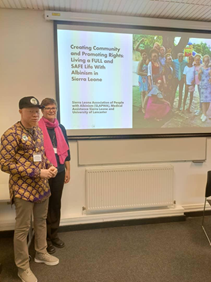Global Call to Protect People with Albinism
By Mackie M. Jalloh
In many African countries, people with albinism are often falsely accused of being witches or cursed individuals, a belief that tragically leads to their persecution and, in some cases, murder. The horrific reality of this widespread abuse has drawn the attention of various human rights groups, campaigners, and international bodies committed to bringing an end to the violence, stigma, and discrimination that people with albinism face.
Recently, at the International Conference on Witchcraft and Human Rights—an event that examined the past, present, and future of harmful practices related to witchcraft accusations—Charlotte, a passionate advocate for justice, was given the platform to speak on behalf of Justice for Witches (JFW). During the conference, Charlotte had the opportunity to meet with extraordinary individuals from across the globe, people who put their lives at risk daily to combat these outdated and deadly beliefs. Their stories and their courage left a lasting impact, fueling the determination to continue advocating for justice.
Although JFW’s core mission is to pardon historical British figures wrongfully accused of witchcraft, Charlotte emphasized that the campaign holds relevance for those still being persecuted under similar pretexts today. Albinism-related witchcraft accusations remain a serious issue in several parts of Africa, where the belief in the supernatural powers of albino body parts has led to ritual killings and mutilations. This violence is often driven by myths, such as the belief that albino body parts bring wealth and good luck, or that people with albinism are not fully human.
Sierra Leone is one country where this tragic belief persists. Founded in 2015, the Sierra Leone Association of Persons with Albinism (SLAPWA) has made it its mission to fight against the social stigma and discrimination faced by people with albinism in the country. During the conference, Charlotte met with the director of SLAPWA, a dedicated and intelligent man with albinism, who is leading the charge to ensure that people with this genetic condition are no longer marginalized, feared, or persecuted.
Charlotte urges JFW supporters and the global community to show solidarity with people with albinism. From children whose bodies are mutilated for superstitious reasons, to adults who struggle to find employment due to fear and ignorance, those living with albinism continue to face unimaginable hardships in 2024. The easiest way to support this cause is to follow SLAPWA’s Facebook page, where updates, educational materials, and donation links are readily available.
The fight for justice for people with albinism aligns with ongoing global efforts to eliminate harmful practices associated with witchcraft accusations and ritual killings. In July 2021, the United Nations Human Rights Council passed Resolution 47/8 on the elimination of harmful practices related to accusations of witchcraft and ritual attacks (HPAWRA). This marked a significant milestone in the battle against these abuses, yet it also signaled the beginning of a new phase in ensuring the resolution is properly implemented across nations.
This year’s conference raised key questions on how to respond to this resolution and ensure that governments across the world are actively working to combat witchcraft-related violence. How can states be held accountable? What is the role of civil society in ensuring that the provisions of Resolution 47/8 are enacted? Participants shared stories of success and failure, examining local, regional, national, and international responses to the issue.
The historical context of witchcraft persecution was also discussed, with insights into what past actions and reforms might offer in terms of guiding modern-day efforts. The conference explored lessons from other harmful practices, such as Female Genital Mutilation (FGM), and looked at how similar campaigns have successfully brought about change.
The ongoing commitment to ending witchcraft-related human rights abuses was evident in the exhibition curated by Professor Charlotte Baker of Lancaster University. With support from the Lancaster University Arts and Humanities Council Impact Acceleration Account, the exhibition was launched by the UN Independent Expert on the Rights of Persons with Albinism, Muluka-Anne Miti-Drummond, at the Peter Scott Gallery on September 19. The exhibition features 30 poignant images that illustrate the brutal human rights violations caused by witchcraft-related beliefs.

The exhibition will travel globally, making stops in Australia, Papua New Guinea, the United States, India, Nigeria, and Ghana, with the goal of raising awareness about the devastating impact of witchcraft accusations and ritual killings on vulnerable groups.
The message from the conference is clear: much progress has been made, but much remains to be done. Civil society, governments, and international bodies must collaborate to ensure the full implementation of Resolution 47/8, with a focus on protecting the most vulnerable populations, including women, children, the elderly, and people with disabilities such as albinism. We must continue to push for legislative reforms, national action plans, and stronger judicial responses to bring an end to these harmful practices and create a safer world for all.
slapw.sl@gmail.com
albinismsierraleone.org
+23276429890/ +23399353368